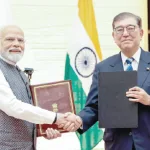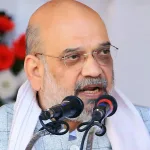The first-ever World Health Organization (WHO) Traditional Medicine Global Summit 2023 closed on August 18, 2023, with a strong commitment from the diverse and unique groups of partners and stakeholders to harness the potential of the evidence-based traditional, complementary and integrative medicine (TCIM) to improve progress towards universal health coverage and Sustainable Development Goals by 2030 for the health and well-being of people and the planet.
Health ministers from G20 and other countries, scientists, practitioners of traditional medicine, health workers and members of civil society from 88 countries participated in the summit that took place in Gandhinagar, Gujarat.
The Summit provided a platform for all stakeholders to share their unique experiences, best practices and ideas for collaboration. It included a diverse group of Indigenous Peoples from different regions of the world (e.g. Australia, Bolivia, Brazil, Canada, Guatemala and New Zealand, among others) for whom many TCIM approaches play a fundamental role in not just health care, but also culture and livelihoods.
Preliminary findings from the WHO Global Survey on Traditional Medicine 2023 shared at the Summit indicate that around 100 countries have TCIM related national policies and strategies. In many WHO Member States, TCIM treatments are part of the essential medicine lists, essential health service packages, and are covered by national health insurance schemes. A large majority of people seek traditional, complementary and integrative medicine interventions for treatment, prevention and management of non communicable diseases, palliative care and rehabilitation.
Dr Bruce Aylward, Assistant Director-General, Universal Health Coverage, Life Course at WHO, as per a media press release of World Health Organisation has highlighted the need for a “stronger evidence base—a WHO priority—to enable countries to develop appropriate regulations and policies around traditional, complementary, and integrative medicine.”
The Summit also highlighted the important role that artificial intelligence can play to mine complex data available on traditional medicine and identify practices that show promise for further scientific evaluation. Eventually, and with ethical and equity safeguards, this evidence can translate into policies that accelerate the safe and effective use of traditional medicine into health systems.
“Together, we have gently shaken up the status quo that has, for far too long, separated different approaches to medicine and health. By taking aim at silos, we are saying we will collaborate all the more to find optimal ways to bring traditional, complementary and integrative medicine well under the umbrella of primary health care and universal health coverage,” Dr Hans Kluge, WHO regional director for Europe has said during the closing of the summit.
Dr Hans further added that they have reiterated how crucial it is to get better evidence on the effectiveness, safety and quality of traditional and complementary medicine. That means innovative methodologies for assessing and evaluating outcomes.
Dr Shyama Kuruvilla, Senior Strategic Adviser and lead for the WHO Traditional Medicine Global Centre, who also led the organization of the Summit said, “We learnt much about the existing policies, tools and practices. But it is clear we have a long journey ahead in using science to further understand, develop and deliver the full potential of TCIM approaches to improve people’s health and well-being in harmony with the planet that sustains us.”
The Summit’s summary document included conclusions and commitments from participants on wide-ranging issues, from global policy, leadership, innovation, health workforce, data, evidence, monitoring, regulation, legal frameworks and protecting biodiversity and sustainable development.
Meanwhile, The World Health Organization (WHO) and the G20 India presidency announced a new Global Initiative on Digital Health (GIDH) on August 19, 2023 at the Health Minister’s Meeting of the G20 Summit held in Gujarat.
The new GIDH initiative (pronounced “guide” for short) will operate as a WHO-managed network and platform to support the implementation of the Global Strategy on Digital Health 2020–2025. WHO serves as the Secretariat for the strategy implementation to converge and convene global standards, best practices and resources to fast-track digital health system transformation.
“We thank the G20 countries and the India G20 Presidency for recognizing WHO’s unique role and strengths in this area and supporting the establishment of the new GIDH network,” Dr Tedros Adhanom Ghebreyesus, WHO Director-General has said during the event.
He further says that the continued support and collaboration of the G20, development partners and international organizations will be necessary to accomplish together what none of us can do alone. WHO is committed to working with countries to strengthen their capacities and to improve access to quality-assured digital solutions for a healthier, safer, fairer future.
Speaking at the launch, union Health Minister Dr Mansukh Mandaviya has said that today was a momentous day in the history of the G20 Health Working Group, wherein G20 countries not only identified a priority for its relevance but collectively worked towards its launch as the new Global Initiative on Digital Health is one of the key deliverables of India’s G20 Presidency.
Since the first WHO resolution on ehealth in 2005 that led the pathway for development and adoption of the WHO Global Strategy on Digital Health, over 120 WHO Member States have developed a national digital health policy or strategy.
While recent experiences during the COVID-19 pandemic resulted in a boost in digital health use, many countries express the need for support to move from product-focused and pilot digital health initiatives to establishing national digital health infrastructure with appropriate governance, policy and a competent health workforce needed to select, maintain and adapt digital health interventions.
Digital health is a proven accelerator to advance health outcomes towards achieving Universal Health Coverage and the health-related Sustainable Development Goals by 2030. Digital health interventions improve health care in many ways, from supporting individuals in managing their health and wellness journeys, to enabling care providers to adhere to guidelines and provide high quality care, to strengthening health systems by improving supply chains and workforce management.
(The author is a regular columnist and can be mailed at [email protected])





